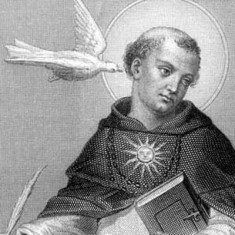| St. Thomas Aquinas | |
|---|---|
 |
|
| Priest & Theologian | |
| Specialty | Scholasticism |
| Born | Jan. 28, 1225 Roccasecca, Kingdom of Sicily |
| Died | Mar. 7, 1274 Fossanova, Papal States |
| Nationality | Italian |
Of the theologians who have existed throughout human history, Thomas Aquinas is one of the most famous and influential of all. His philosophy was heavy rooted in the theory of natural theology, a belief system that somewhat combined concepts of the natural world with traditional beliefs about God and religion. Aquinas was eventually canonized as a saint by the Catholic Church.
Early Years of Thomas Aquinas
Thomas Aquinas was born on January 28, 1225. His place of birth was Roccasecca, which was part of the Kingdom of Sicily at the time. He was born into a family that could be called minor nobility and it was suggested that he follow the path of becoming an abbot.
Young Thomas started his formal education at the age of five and, as he grew older, he was introduced to the many classic philosophers of antiquity. Aristotle, Maimonides, and Averroes would be among the main philosophers who would influence his ideas and beliefs about life and religion.
Being Kidnapped
When Thomas was 19, Aquinas decided to join the newly formed Dominican Order. His family was not pleased with this decision. So while he was traveling, his family had him kidnapped and returned home.
When he returned home, he was actually imprisoned for two years. The hope here was that he would eventually renounce his allegiance to the Dominican Order and its belief system. Eventually he was able to run away and travel to Rome. From there, he moved to Paris to study at the Faculty of the Arts at the University of Paris.
Works of St. Thomas Aquinas
The school of thought born of the theories of Aquinas is called Thomism. Thomism was rooted in the belief in the notion that truth can be derived from any source. Aquinas was a realist and he even studied many different religious texts in order to create a broader and more expanded mind. The philosophy was also heavily influenced by the argumentative reasoning associated with Aristotle.
The Summa Theologiæ was the most important written work of Aquinas. The work was written from 1265 to 1274 and it centered on the main teaching of theology within the Catholic Church. In the work, Aquinas addressed several profound topics, including the creation of man, the purpose of man and his existence, the role of Christ, the sacraments, the very existence of God, and how a man who has lost his relationship with God can return back to the deity.
Among the most important components of the work would be the Five Ways, which reflects five unique arguments to prove the existence of God. Interestingly, these arguments only compose a very small fraction of a lengthy work. Perhaps it would be the profound nature of the argument that draws so much attention.
The Concept of Natural Theology

In order understand the philosophy of Thomas Aquinas, one has to further understand the concept of natural philosophy since it guides the intellectual basis of his thinking.
On the most basic level of understanding, natural theology can be considered a form of theology that is based on a mix of everyday experience and common reasoning. For many living at the time of Aquinas, the most common theological approach to thinking was revealed theology. This was rooted in revelations from the Scriptures and personal religious awakenings. Such theological revelations can come from inward beliefs and may not be rooted in actual reality or clear, well-thought out reasoning.
Transcendental theology was seemingly rejected by Aquinas as this form of theology assumed it was impossible to prove the existence of God. To reiterate, Aquinas had developed five proofs for the existence of God, which was antithetical to transcendental theology theories.
Death and Legacy
In 1272, Aquinas moved to Naples to help establish a new teaching venue. While giving lectures in this location, he worked on the third book of the Summa Theologiæ. It is believed by many, during his tenure here, Aquinas had some sort of divine experience with God, although Aquinas would not speak much of it. This belief derives from very atypical and strange behavior Aquinas exhibited while praying at a convent in Naples.
Aquinas passed away on March 7, 1274. He was canonized as a saint on July 18, 1323.